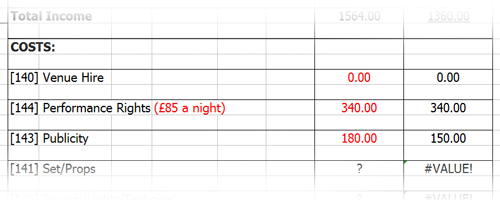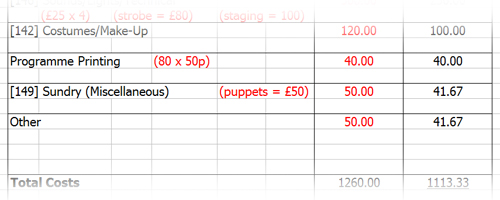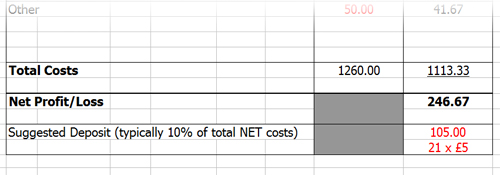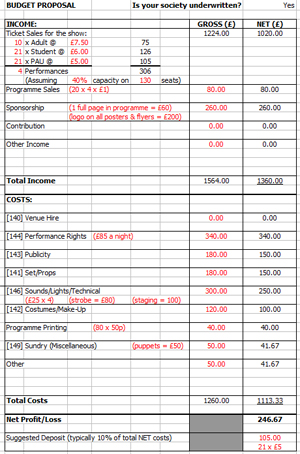Budgets
Every show must have a budget that estimates the amount of money the show will make, whilst setting limits on the spending for the different areas of a show, to result in a profit. This budget must then be passed by the committee before a show can be performed. The standard budget form that must be filled in can be downloaded from the Resources section.
To fill out this budget form all you need to do is replace all the question marks with your own specific values and the '#' values are worked out for you. In the Resources section you can also have a look at some past show budgets for each individual performance slot, and compare the predicted figures to the actual figures for each show.
Below is a detailed outline of the best methods for creating a good budget.
Income

First you will need to estimate how much income your show is going to generate, remembering that on a budget, you want to estimate the least possible income with the most possible expenditure and if that still comes out as a profit, then any more income will only be a good thing.
The values in red above are the only values you have to input, and all other figures will be worked out for you. We start off with the predicted number of audience each night. On average, the least audience capacity we've had for our shows is around 40%, so for the Annex Theatre, where most of our shows choose to perform, the capacity is 130 seats making that 52 people per night.
You must then estimate how this number is divided up between adults, students and PA members, with usually an equal number of PA members and students attending, and fewer adults, setting ticket prices for each. It's quite good to keep the price for a PA ticket at £5 but for the student and adult prices, you can vary it depending on how much you think people will be willing to pay.
Finally you must put in how many nights your show will be running for. Again, the usual run time is Wednesday to Saturday every evening, but you can add an extra matinee on the Saturday, or an extra Tuesday performance as well, it's up to you.

Once you have filled out all of this, the budget form should have worked out the net and gross income from ticket sales. Now you can fill in the other income you may recieve such as programme sales and society sponsorship. It's always a good idea to hunt around and see if companies and local businesses will give your show some money in return for their logos on your posters or an advert in the programme. This can get you anywhere from £50 - £400, but it all depends on what you can offer them. As for programme sales, people usually won't buy more than 10-20 a night, so try and be realistic. The other two sections are only really used in special circumstances, like for Edinburgh it is usually expected that the cast make a contribution along with a deposit (explained later), and Other Income is for anything else such as if you manage to secure private funding or something, but that rarely happens.
Now that this section has been fully filled in, you will have a total income, net and gross. Again, remember that this should be an estimate of the least amount of money your show will produce.
Expenditure

Now you come to filling in what you are going to spend on your show, which should always be a high estimate of the most you will need to spend, then you won't ever go over budget. Firstly, venue hire; if you are using the Annex Theatre then this is free, but other venues such as The Nuffield Theatre or other external venues may charge you so you will need to source a quote.
Performance rights depend entirely on the specific show, and these are paid when you apply to the license holder to put on that production. Most shows are held by a license agency, the most common being Samuel French Ltd. Here you can not only browse all the plays they have to offer, but also find out how much one costs, and apply for the rights for a particular show.
Now onto publicity; some prices for the different forms of publicity and other costs from various companies can be found on the main Production page. Using these costs you can work out how much you want to spend on publicity, usually around £150 - £200, but obviously this depends on your ideas.

The next three sections of the budget, Set/Props, Sounds/Lights/Technical & Costumes/Make-Up are very specific to the show itself, and can vary greatly. It's always a good idea to do a few a trips to the PA house, a house owned by the PA where all of the costumes, set and props used in shows over the years are stored. It's all free to use and can save you quite a bit of money so it's worth having a look.
Another thing to be aware of is that StageSoc, our wonderful backstage society, charge us a fee per night to use all of the technical equipment in the Annex. This obviously does not count for other venues and you will need to find out any costs that they might charge. Also if you want any extra technical equipment such as a strobe, smoke machine, or moving lights, this is all extra. The best thing to do would be to talk to a member of StageSoc and ask them about the costs for any technical equipment you want use.

The final sections are fairly simple. Programme Printing is dependent upon wherever you choose to get your programmes printed, and again various costs for different companies can be found on the main Production page, and on how many you predict to sell in the Income section. Sundry (Miscellaneous) is a section for anything that you want in the show that does not fit into any of the other categories, for example if you wanted to build puppets, or general printing costs etc. If you don't have anything this specific in mind then put it to £0. And finally, the other section is in case anything goes wrong and you need a bit of extra money. It's always useful to put an extra £50 or so under this section to act as a buffer.
Profit

Once you have all of this filled out, you should end up with a total expenditure figure and hopefully, if you've done a good budget, a positive profit at the bottom. If you haven't then it is a bad budget and you will need to rethink some things. The profit does not have to be huge as, remember you should have estimated the least amount of income you will get, and the most amount you will ever need to spend in each section of the Expenditure, and so it is likely you will bring in more and spend less, resulting in an even bigger profit. The final section underneath the profit mentions a deposit. This is something the union ask for from each cast and production team member involved with the show to cover the costs if it does make a loss. Theatre Group rarely make losses nowadays and as long as the show makes some profit, these deposits get returned to the individuals. The total deposit should be roughly equal to about 10% of the overall net expenditure, but it usually works out to between £5 - £10 each.
So there you have it! How to make a successul budget. Just remember you need to be realistic about all the figures, or it won't get passed. If you click on the picture to the left you can download this example budget form and in the Resources section you can find some previous show budgets, along with the actual money they made to further help you.
If at any point you need help in anything to do with budgeting or anything financially related to a show then get in contact with the Treasurer and they will always be happy to help.
